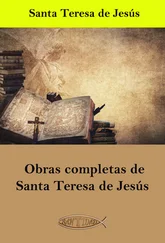10. O my son, 6so humble is he to whom this writing is directed, and who has commanded me to write, that he suffers himself to be thus addressed,--you, my father, only must see these things, in which I seem to have transgressed all bounds; for no reason can keep me reasonable when our Lord draws me out of myself. Since my communion this morning, 7I do not believe that I am the person who is speaking; I seem to be dreaming the things I see, and I wish I might never see any but people ill, as I am now. I beseech you, my father, let us all be mad, for the love of Him who for our sakes suffered men to say of Him that He was mad. 8
11. You, my father, say that you wish me well. I wish you would prove it by disposing yourself so that God may bestow this grace upon you; for I see very few people who have not too much sense for everything they have to do: and it may be that I have more than anybody else. Your reverence must not allow it; you are my father, for you are my confessor, and the person to whom I have trusted my soul; disperse my delusions by telling the truth; for truths of this sort are very rarely told.
12. I wish we five, who now love one another in our Lord, had made some such arrangement as this: as others in these times have met together in secret 9to plot wickedness and heresies against His Majesty, so we might contrive to meet together now and then, in order to undeceive one another, to tell each other wherein we might improve ourselves, and be more pleasing unto God; for there is no one that knows himself as well as he is known of others who see him, if it be with eyes of love and the wish to do him good. I say; in secret; for language of this kind is no longer in use; even preachers go about arranging their sermons so as to displease no one. 10They have a good intention, and their work is good; yet still few amend their lives. But how is it that they are not many who, in consequence of these sermons, abstain from public sins? Well, I think it is because the preachers are highly sensible men. They are not burning with the great fire of the love of God, as the Apostles were, casting worldly prudence aside; and so their fire throws out but little heat. I do not say that their fire ought to burn like that of the Apostles, but I do wish it were a stronger fire than I see it is. Do you, my father, know wherein much of this fire consists? In the hatred of this life, in the desertion of its honours, in being utterly indifferent whether we lose or gain anything or everything, provided the truth be told and maintained for the glory of God; for he who is courageously in earnest for God, looks upon loss or gain indifferently. I do not say that I am a person of this kind, but I wish I was.
13. Oh, grand freedom, to regard it as a captivity to be obliged to live and converse with men according to the laws of the world! It is the gift of our Lord; there is not a slave who would not imperil everything that he might escape and return to his country; and as this is the true road, there is no reason why we should linger; for we shall never effectually gain a treasure so great, so long as this life is not ended. May our Lord give us His grace for that end! You, my father, if it shall seem good to you, will tear up what I have written, and consider it as a letter for yourself alone, and forgive me that I have been very bold.
1"The third degree, or third water, of the Saint, must begin, I think, with the prayer of infused recollection, include that of infused quiet, and end in that of inebriation; because it is not in our power to draw this water--all we can do is to direct the stream." (Francis. de St. Thoma, Medulla Mystica, tr. iv. ch. xii. p. 208).
2See St. John of the Cross, Spirit. Canticle, stanza xvii. vol. ii. p. 98, Engl. trans.
3St. Luke xv. 9: "Convocat amicas et vicinas."
4 Foundations , ch. xxix. § 9.
5The Saint herself ( De la Fuente ).
6This was either F. Ybañez or the Inquisitor Soto, if the expression did not occur in the first Life. F. Dom. Bañes struck out "son," and wrote "father" in its place, omitting the words, "so humble is he" ( De la Fuente ).
7See § 3, above.
8St. John x. 20: "Dæmonium habet et insanit."
9The Saint refers to the secret meetings of heretics in Valladolid, under the direction of a fallen priest, the Doctor Agostino Cazalla, whose vanity led him to imitate Luther. Some nuns in Valladolid were imprisoned, Cazalla strangled, and his body burnt, in 1559 ( De la Fuente ).
10Father Bañes wrote here on the margin of the Saint's MS, "Legant prædicatores" ( De la Fuente ).
Table of Contents
The Third State of Prayer. The Effects Thereof. The Hindrance Caused by the Imagination and the Memory.
1. Enough has been said of this manner of prayer, and of what the soul has to do, or rather, to speak more correctly, of what God is doing within it; for it is He who now takes upon Himself the gardener's work, and who will have the soul take its ease; except that the will is consenting to the graces, the fruition of which it has, and that it must resign itself to all that the True Wisdom would accomplish in it--for which it is certain it has need of courage; because the joy is so great, that the soul seems now and then to be on the very point of going forth out of the body: and what a blessed death that would be! Now, I think it is for the soul's good--as you, my father, have been told--to abandon itself into the arms of God altogether; if He will take it to heaven, let it go; if to hell, no matter, as it is going thither with its sovereign Good. If life is to come to an end for ever, so it wills; if it is to last a thousand years, it wills that also: His Majesty may do with it as with His own property,--the soul no longer belongs to itself, it has been given wholly to our Lord; let it cast all care utterly away.
2. My meaning is that, in a state of prayer, so high as this, the soul understands that God is doing His work without any fatiguing of the understanding, except that, as it seems to me, it is as if amazed in beholding our Lord taking upon Himself the work of the good gardener, refusing to let the soul undergo any labour whatever, but that of taking its pleasure in the flowers beginning to send forth their fragrance; for when God raises a soul up to this state, it can do all this, and much more,--for these are the effects of it.
3. In one of these visits, how brief soever it may be, the Gardener, being who He is,--in a word, the Creator of the water,--pours the water without stint; and what the poor soul, with the labour, perhaps, of twenty years in fatiguing the understanding, could not bring about, that the heavenly Gardener accomplishes in an instant, causing the fruit both to grow and ripen; so that the soul, such being the will of our Lord, may derive its sustenance from its garden. But He allows it not to divide the fruit with others, until by eating thereof, it is strong enough not to waste it in the mere tasting of it,--giving to Him none of the produce, nor making any compensation for it to Him who supplies it,--lest it should be maintaining others, feeding them at its own cost, and itself perhaps dying of hunger. 1The meaning of this is perfectly clear for those who have understanding enough to apply it--much more clear than I can make it; and I am tired.
4. Finally, the virtues are now stronger than they were during the preceding prayer of quiet; for the soul sees itself to be other than it was, and it knows not how it is beginning to do great things in the odour which the flowers send forth; it being our Lord's will that the flowers should open, in order that the soul may believe itself to be in possession of virtue; though it sees most clearly that it cannot, and never could, acquire them in many years, and that the heavenly Gardener has given them to it in that instant. Now, too, the humility of the soul is much greater and deeper than it was before; because it sees more clearly that it did neither much nor little, beyond giving its consent that our Lord might work those graces in it, and then accepting them willingly.
Читать дальше












